Inside Europol
- Published
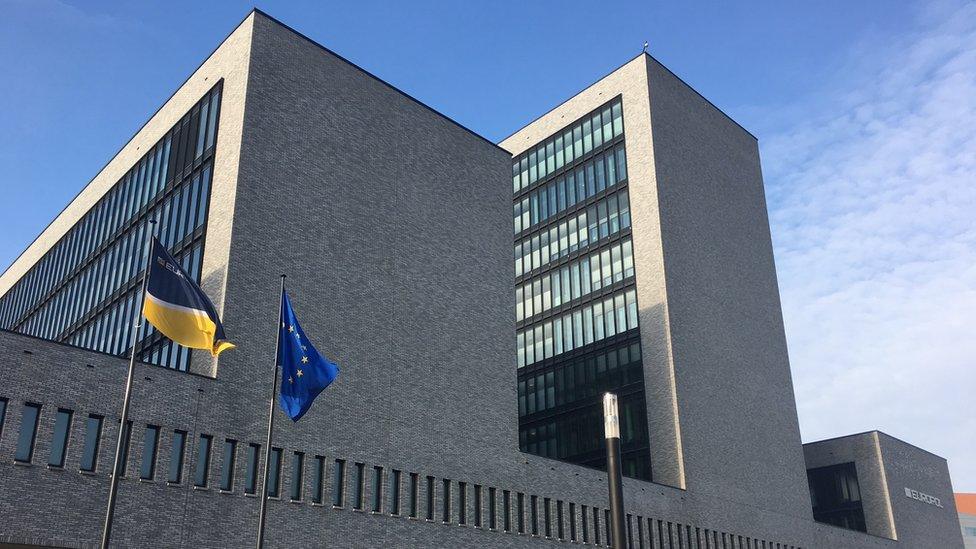
"When I started 10 years ago it was pretty quiet."
In a light, airy office on the ground floor of Europol's brutalist headquarters in The Hague, David Ellero, one of its senior officials, is reflecting on how the organisation has changed since he joined in 2007. In those days, some people confused Europol with Interpol and others thought it was just an annoying part of the EU's bureaucratic machinery.
"Our counterparts, or the investigators in the member states, didn't really know what we did," Ellero says.
Now, the European Police Office, to give it its official title, is recognised across the law enforcement world, with a budget of almost £100m, and a workforce of more than 1000, to match.
Its effectiveness certainly isn't lost on the UK government, which is preparing to start negotiations about Britain's role in Europol after the country leaves the EU. Amber Rudd, the Home Secretary, has said that the agency plays an "incredibly important role in keeping us safe in Europe".
"The phone rings quite often," says Ellero, with typical understatement.
A former detective - much of his career was spent in Italy investigating Mafia killings - he now heads a department tackling the top organised crime groups across the Continent.
"For a criminal to communicate with his counterparts across Europe it takes a second on WhatsApp.
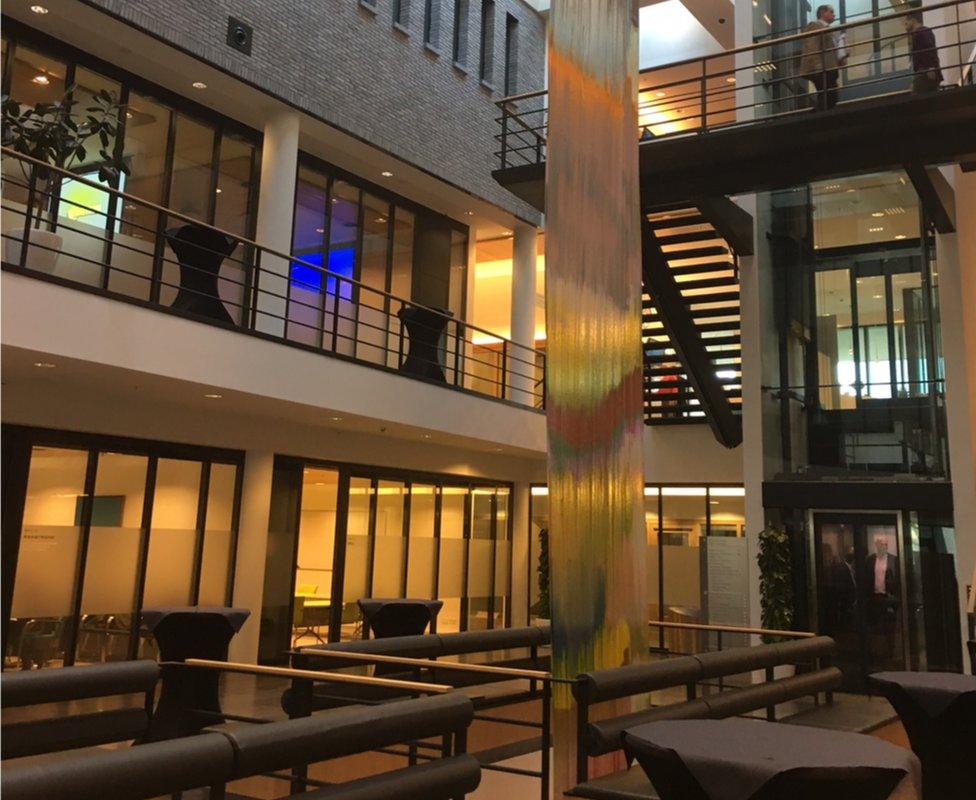
Europol headquarters in The Hague - the second floor is a "secure zone"
"We need to make sure that... police (can act) at the same speed even if they have different judicial set-ups and and even if they speak different languages," adds Ellero, pointing out that "even pickpockets" operate transnationally.
The main function of Europol, which started work in 1999, is to act as a hub for the exchange of intelligence between 750 global agencies. It also oversees databases containing tens of millions of pieces of information on criminals, offences and suspect vehicles, and it helps co-ordinate crime-fighting operations against drug dealers, human trafficking gangs and terrorists.

INTELLIGENCE
Forty countries - including the EU member states and others such as the US and Australia - communicate via a system called Siena - hundreds of thousands of encrypted operational messages are sent every year.
The agency's main intelligence database - Europol Information System (EIS) - keeps track of crimes, suspects and convicted criminals, including terrorism cases. Only Europol members have direct access to the EIS; other countries must put in a request.
Europol uses a unique database known as the Analysis Work File (AWF). More than 100 specialists based in The Hague use AWF to help investigators across the EU better understand and tackle crime and organised crime groups - the system has more than 33 million active entries.
Outside Europol, other pan-European intelligence systems help in the fight against crime including the Schengen Information System (SIS). Although the UK is not among the 26 countries that have open borders under the Schengen agreement it can access the database which records cross-border movements and associated intelligence.
In 2015, the SIS was interrogated three billion times by law enforcement officers across Europe with 64 million "alerts" placed on the system every day relating to everything from stolen vehicles and missing children to foreign fighters returning to Europe from Syria and Iraq.

Indeed, one of the fastest-growing areas of work at Europol involves countering the spread of propaganda from terrorist groups and extremists. A 26-strong team in the Internet Referral Unit spends each day combing the web for material and then persuading social media companies and service providers to remove it.
The head of the unit, Vincent Semestre, likens it to "emptying the ocean with a spoon". He says they've identified 91 internet platforms that have contained extremist content, more than 50 of which have co-operated with Europol in deleting the material.
Over the past 18 months the team's most intense periods of work have come after terror attacks in Europe, when it's had to act quickly to prevent the spread of extremist images, videos and postings.
"You need to have capacity in-house, which is understanding this ideology in its original language: which means staff speaking Arabic, speaking Russian, speaking Turkish," says Semestre, who worked for the French judicial police before joining Europol.
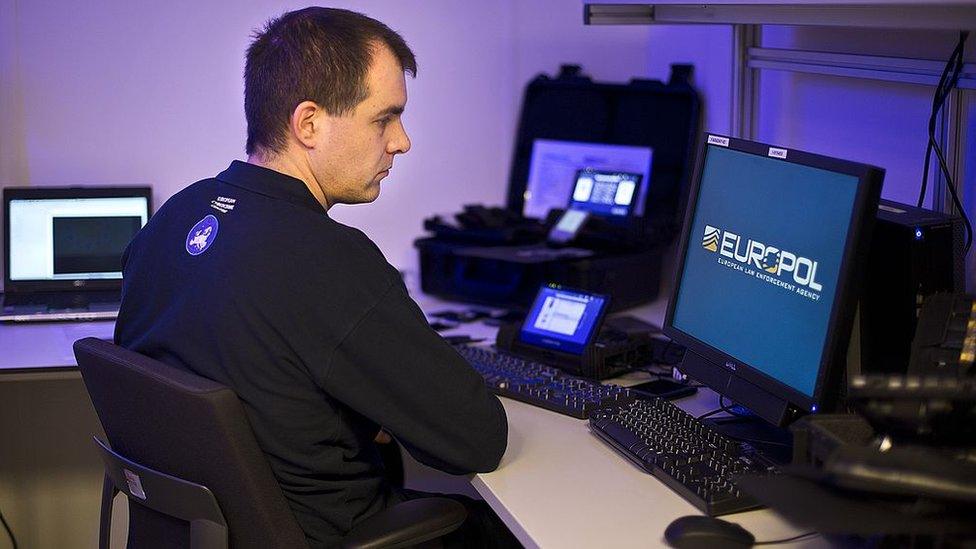
The European Cybercrime Centre is just one part of Europol
"Multiplying these resources needed by all the member states would be quite difficult.
"You need to have continuous monitoring of the technological environment so it made sense to have this centralised in Europol in order to provide these centralised services to all the member states," he adds.
Despite the serious nature of their work, there's a relaxed and friendly atmosphere inside the Europol building - it looks more like an art college than a police station.
Nevertheless, security is tight: everyone is searched on entry, bags are X-rayed, identity documents are taken away to be checked. Around the atrium, blinds are drawn on the windows of meeting rooms, signifying that confidential briefings are taking place.
On the second floor, there's another layer of protection, with extra ID checks and access possible only via a palm print scanner. It's known as the "secure zone" and it's here, and on the floors above, that each of the EU's member states, plus 14 other countries, have their own staff.
In total, there are more than 200 of them - they're called liaison officers - and they specialise in crimes such as gun-running, trafficking and drug smuggling.
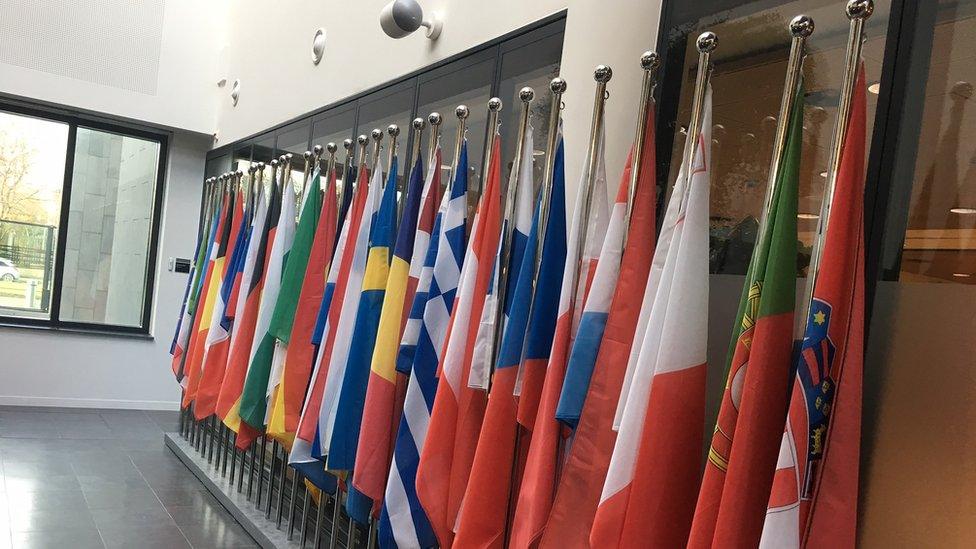
Every EU member state, plus 14 other nations, has staff in the building
The main benefit is that representatives of each country can meet in person to sort out the complexities of cross-border police work. For Britain's 17 liaison officers, who work from an office which neighbours the bureaux of Luxembourg, the Republic of Ireland, Belgium and the Netherlands, an added advantage is that the language of Europol is English.
Kenny Dron, who's in charge of the UK office, says there's no need for long-distance phone calls, texts... or emails.
"Emails just don't work when you've got people to protect and lives to protect back in the UK," says Dron, who's spent 30 years in border policing and intelligence work.
"So you've got to have that face-to-face contact to ensure that the other country and your colleagues understand the severity of the situation."
Although Britain will almost certainly continue to have liaison officers at Europol after Brexit (America isn't in the EU and it has more than 20 staff based there) what's far less clear is the future of the 50 other UK law enforcement employees in the Hague. They're currently overseeing a range of cross-border policing operations, on child sexual exploitation, excise fraud and heroin trafficking, among others.
One of the British officers, Laura Clark, seconded from the National Crime Agency to work in Europol's migrant smuggling centre, says it would be a "real shame" if Britain can't continue to play a major part in the organisation.
"We would miss a lot of the intelligence that goes through. There's a lot of juicy intelligence that I see that wouldn't be able to get given to countries, a lot of support for investigations wouldn't happen," she says.
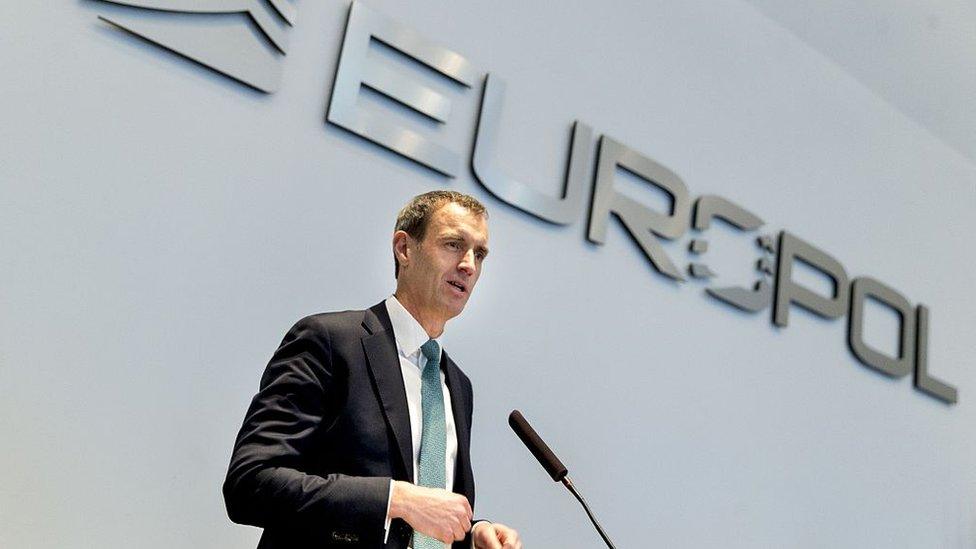
Europol director Rob Wainwright speaks of "some diminution" in the UK's rights and responsibilities to the organisation post-Brexit
In January, reflecting on Britain's likely relationship with Europol after Brexit, Amber Rudd told the House of Commons Home Affairs Select Committee: "I expect and hope us to have an active role going forward," pointing out that the UK was "one of the largest contributors" to the EU agency's database.
Rob Wainwright, Europol's director since 2009, goes further, saying Britain is "rightly regarded as a natural leader" on security issues.
"There is no doubt that if you look over the last 20 or 30 years the evolution of police co-operation in Europe, not just at Europol, there is a heavy British footprint around that," says Wainwright, who declares himself to be a "proud Brit".
But he says the "fullest benefits" of the organisation go to EU-member states, and if, after Brexit, Britain has an arrangement with Europol akin to that of non-members such as the USA or Norway, Wainwright says there'll be "some diminution" in the UK's rights and responsibilities. They have limited access to intelligence and less say over operations and decisions.
"The opportunity therefore to share that experience, the opportunity to leverage that influence, is going to change and maybe diminish and I think those in charge of running that in Britain will need to find alternative ways therefore of making sure that Britain can still have a real voice in European security affairs," he says.
By then, Rob Wainwright, who's credited with introducing reforms to Europol that have enhanced its standing and effectiveness, will have left the Hague headquarters, as his contract expires in April 2018.
His successor will inherit an organisation in good shape - but one that will have to adjust to a different relationship with the UK.